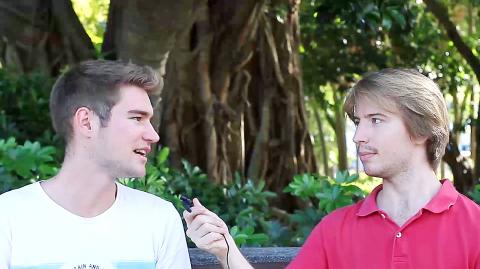The majority of the dozen Taiwanese interviewed by the Taipei Times on Wednesday of last week believe that caning is a justifiable punishment for repeat drunk driving.
“We should strip them bare and flog them in public, men and women alike,” said one pedestrian.
A petition calling for repeat drunk driving offenders to receive corporeal punishment was submitted to a government-funded public policy platform on Oct. 23, and as of press time has garnered over 27,000 signatures. Minister Without Portfolio Audrey Tang (唐鳳) held a public hearing on Friday to discuss the proposal. Two days before the forum, the Taipei Times sampled opinions from passersby in and around National Taiwan University.

Photo courtesy of Stephanie Cardona
“I totally support the proposal,” the same man added. “Humans are emotional animals. If they lose face, they will never do it again.”
One Indian graduate student suggested the government should adopt alternative approaches, such as education campaigns on the dangers of drunk driving.
FINES NOT EFFECTIVE
Yan Tzu-shen (顏子娠), a female nightclub worker and three-time DUI offender, drove her Mercedes Benz into a scooter last month while inebriated, killing the rider, a young bakery owner. The incident has generated heated debate and has been used by advocates as an example as to why caning is needed.
“Fines don’t stop these people, they’ve got lots of money... broadcast it live on television, that would stop them,” said one male pedestrian.
A faculty member said the nightclub that employed her should also be fined for facilitating the crime.
HUMAN RIGHTS QUESTION
Last month Premier William Lai (賴清德) cast doubt over the proposal, saying caning might violate Taiwan’s human rights commitments.
The NTU faculty member seconded Lai’s statement, adding that adopting caning would seriously impact Taiwan’s international reputation as a defender of human rights.
“We don’t use any kind of violent punishment in Germany,” said a German man who was visibly shocked upon hearing the proposal. “I think this would definitely violate human rights.”
Others had a different take.
“The drunk driver violated the victim’s right to life, so why do they deserve human rights?” one woman said.

In the March 9 edition of the Taipei Times a piece by Ninon Godefroy ran with the headine “The quiet, gentle rhythm of Taiwan.” It started with the line “Taiwan is a small, humble place. There is no Eiffel Tower, no pyramids — no singular attraction that draws the world’s attention.” I laughed out loud at that. This was out of no disrespect for the author or the piece, which made some interesting analogies and good points about how both Din Tai Fung’s and Taiwan Semiconductor Manufacturing Co’s (TSMC, 台積電) meticulous attention to detail and quality are not quite up to

April 21 to April 27 Hsieh Er’s (謝娥) political fortunes were rising fast after she got out of jail and joined the Chinese Nationalist Party (KMT) in December 1945. Not only did she hold key positions in various committees, she was elected the only woman on the Taipei City Council and headed to Nanjing in 1946 as the sole Taiwanese female representative to the National Constituent Assembly. With the support of first lady Soong May-ling (宋美齡), she started the Taipei Women’s Association and Taiwan Provincial Women’s Association, where she

Chinese Nationalist Party (KMT) Chairman Eric Chu (朱立倫) hatched a bold plan to charge forward and seize the initiative when he held a protest in front of the Taipei City Prosecutors’ Office. Though risky, because illegal, its success would help tackle at least six problems facing both himself and the KMT. What he did not see coming was Taipei Mayor Chiang Wan-an (將萬安) tripping him up out of the gate. In spite of Chu being the most consequential and successful KMT chairman since the early 2010s — arguably saving the party from financial ruin and restoring its electoral viability —

It is one of the more remarkable facts of Taiwan history that it was never occupied or claimed by any of the numerous kingdoms of southern China — Han or otherwise — that lay just across the water from it. None of their brilliant ministers ever discovered that Taiwan was a “core interest” of the state whose annexation was “inevitable.” As Paul Kua notes in an excellent monograph laying out how the Portuguese gave Taiwan the name “Formosa,” the first Europeans to express an interest in occupying Taiwan were the Spanish. Tonio Andrade in his seminal work, How Taiwan Became Chinese,